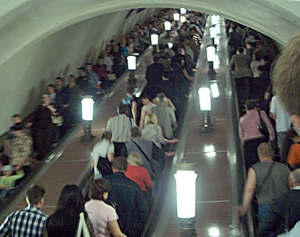Faith responds to mass murder in the Moscow subway
by James Dimitroff
Reports of two explosions on March 29 in the Moscow subway during morning rush hour, shock and wound us as we recoil again from news of innocent lives suddenly destroyed.
The first explosion, at 7:55 a.m., hit Lubyanka underground metro station; the second, at 8:40, devastated Park Kultury metro station near Gorky Park. Russia’s Ministry for Catastrophic Events informed the world that 39 people died in the explosions and 32 were seriously wounded. Preliminary reports point to two female suicide bombers, so-called Black Widows, using their terror actions to punish Russia for ethnic grievances in the North Caucasus.
Russia has declared a national Day of Mourning to remember the victims of this atrocity.
Russia has suffered terrorism before. As our family prepared to leave St. Petersburg in 2000, after Lutheran mission service there, terrorist explosions damaged several large apartment blocks over the course of about a week.
To gain perspective on the horror of this recent terrorist act, some facts are helpful. The Russian subway system and, in particular, the Moscow metro, boasts the world’s largest network: more than 300 km of track laid out in concentric circles. Moscow’s metro usage totals 10 million trips every day, making it the busiest subway system in the world.
From our years of living and working in Russia I know that entering the Metro is one of the foreigner’s first and most startling experiences. Startling because all metro lines lie deep underground, some 30 metres or more. Access is by an escalator that moves swiftly downward at a steep angle. As you travel down there are times you cannot see your destination deep at the other end—it’s a bit like descending into a dark well. Russian public decorum dictates there must be no loud, random conversation on the escalators. Friends may whisper to each other in hushed tones. The experience is not for the claustrophobic.
News analysts report that Moscow’s metro provides “soft targets” for terrorists who wish to hit the civilian population. Other large cities like London, Paris, New York and Toronto also have highly developed underground transport. These confined underground spaces add an extra note of horror as one thinks of potential terrorism there.
The Bible warns terrorists with words from the prophet Isaiah: “Woe to those who call evil good and good evil, who put darkness for light and light for darkness, who put bitter for sweet and sweet for bitter. Woe to those who are wise in their own eyes and clever in their own sight” (Isaiah 5:20-21).
Christians are called to trust in the Lord of life. He promises never to abandon us, but to remain close by to protect us from all harm, no matter what the source. These promises are among our Lord’s last words to His followers before His return to heaven after resurrection.
As deadly terror becomes a daily threat to civilians in cities like Moscow, we also take special comfort in the promises of Psalm 91: “If you make the Most High your dwelling—even the Lord who is my refuge—then no harm will befall you, no disaster will come near your tent. For he will command his angels concerning you to guard you in all your ways” (v. 9-11).
And if Our Lord suddenly calls home a terrorist’s victim who is a believer in Jesus, we know that person is at rest in the Lord until His second coming.
Confronting terror, especially in subway transport systems, brings us to the reality of how faith in Christ lifts our hearts to trust in our Saviour.
Rev. James Dimitroff is pastor at Grace Lutheran Church in Saskatoon, Saskatchewan. He served in Russia with The Lutheran Church–Missouri Synod from 1993-2000.





